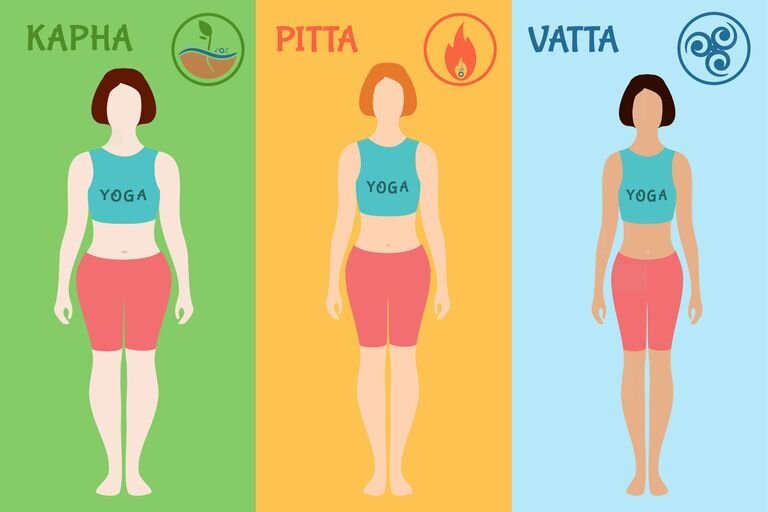Clients of mine have shared the struggles, sadness, and frustration of feeling overweight in a world that prizes thinness. I get excited to share with them a new approach and why I love ayurveda, because it offers a balanced approach based on time tested wisdom to this challenge.
Before I dive into the ayurvedic approach to losing weight, it’s really important to understand if you are actually overweight or have a naturally heavy constitution. This is the beauty of understanding the doshas! In ayurveda, we understand three main mindbody types, or doshas. The vata body type is the smallest, with fine bones and long, thin features. The pitta type is the mama bear: medium framed and lean but muscular. The kapha type is the most robust: strong, heavy, stable, and naturally bigger than the other doshas. A 5’8” Kapha person has a very different healthy average body weight than a 5’8” Vata friend. So, knowing your dosha type can provide some answers, and great relief, about your weight struggles!
But too much weight gain can occur in any dosha, and is generally considered a kapha imbalance.
Imbalanced kapha shows up as weight gain with difficulty losing weight, but can also come with sluggish digestion, lethargy, depression, stubbornness, difficulty adapting to change, congestion, and growths on the body.
When attempting to reduce weight, and excess kapha dosha, the ayurvedic approach overall is to focus on firing up the agni, aka digestive fire, removing ama aka toxins, releasing attachments through energy clearing and reflective practices, and using herbs to cleanse, clear, fire up, and purify the channels of the body. Each approach is unique to the individual and based on a person’s dosha and other variables, but here are some of the ways ayurveda addresses weight loss:
Eating for Balance
Ayurveda emphasizes the importance of eating according to your dosha to maintain balance. For weight loss, favor whole, fresh foods and avoid processed foods and refined products like white sugar and white bread. The Mediterranean diet is a good basis to begin with, focusing on lots of green veggies, light grains like brown and wild rice, barley, and quinoa, light proteins such as poultry, tofu, legumes, and small amounts of fresh dairy. Include healthy oils in moderation, especially olive oil, while avoiding fried foods and minimizing saturated fats from red meat. Include warming spices like ginger, cumin, pepper, coriander, mustard seed, and turmeric in your meals to support digestion and metabolism. Focus on the pungent, astringent, and bitter tastes. Drinking Barley Water is a traditional ayurvedic approach to weight loss. Additionally, mindful eating practices such as eating slowly and avoiding distractions can help prevent overeating.
Routine
Establishing a consistent daily routine can support weight loss efforts. Aim to wake up and go to bed at the same time each day, as irregular sleep patterns can contribute to weight gain. Ideal sleeping hours are 10pm-6am. Eating at regular mealtimes is also essential, and too much snacking can lead to sluggish digestion, especially for kapha types, as an already slower digestive system becomes even slower when new food is introduced while the last meal is still in the stomach. Ironically, eating too little or fasting for long periods also slows down the metabolism. Ayurveda has recommended moderate intermittent fasting for thousands of years, and it looks like this: eating a light early dinner. If you finish dinner by 6/7 and eat breakfast at 8/9, that’s a 14-15 hour window of fasting. The body beings burning fat 12 hours after it’s last meal, so those 2-3 hours in the early morning are prime fat burning times.
Incorporate regular movement practices like yoga, dance, or walking into your daily routine to promote circulation and boost metabolism. Don’t overdo it though, overly strenuous exercise can increase your stress hormones, leading to the body to retain weight. Moderate weight lifting is also helpful, because more muscle means a faster metabolism.
Herbal Support
The following are some herbs that are often recommended for weight loss:
Triphala: the three fruits: amalaki, bibhitaki, and haritaki, a classic formula to support good digestion, healthy microbiome, and effective elimination
Guggulu: scraping, purifying, and cleansing, often combined with triphala to assist with weight loss
Trikatu: the three pungents: black pepper, long pepper (pippali) and ginger, taken with meals to fire up the metabolism
Shardunika/Gymnema: the sweet destroyer, helping to curb sugar cravings and regulate blood sugar
Mind-Body Connection
Ayurveda recognizes the connection between the mind and body in weight management. Practice stress-reducing techniques such as meditation, deep breathing, yoga nidra, and restorative yoga to reduce cortisol levels and emotional eating. Cultivate a positive mindset towards your body with practices such as abhyanga/loving self massage, and gentle self love messages such as this affirmation from my teacher Monica Mesa Dasi “I deeply and profoundly love, accept, respect, and forgive myself”. Reduce or take breaks from social media, which challenges our sense of self worth regularly with unrealistic comparisons and ideals.
By incorporating Ayurvedic practices into your daily life, you can manage weight loss gently and sustainably. Remember that each individual is unique, and it may take time to find the right balance for your body. I would love to support you individually, so consider an Ayurvedic consultation for personalized guidance on your weight loss journey.
